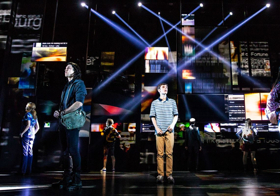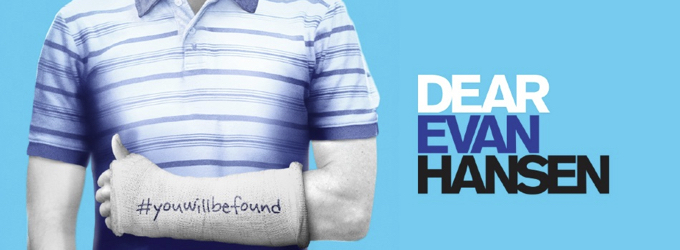Review: DEAR EVAN HANSEN Tour Is So Big/So Small

After Bobby in Company, the titular character of Dear Evan Hansen has to be musical theatre's most psychoanalyzed protagonist. The biggest difference is that the worst thing Bobby ever did in the course of his thirty-fifth-birthday adventures was talk his way into bed with a woman he didn't respect. Evan Hansen, on the other hand... you know, let's not sugar coat it. Evan Hansen is (to paraphrase language used in the show itself) kinda f-ed up. And maybe that's a good thing, because the severe moral ambiguity of its central character makes this teen-targeting pop musical something more substantial than any of its competitors, especially the fun but fluffy Be More Chill currently running on Broadway due in no small part to Hansen's success. Now, the national tour allows Pittsburgh to see the biggest pop juggernaut on Broadway since Hamilton.
The story, simultaneously simple and more complex than it appears, revolves around high school senior Evan Hansen (Ben Levi Ross), whose continued high school existence is hindered by an anxiety disorder and a strongly-implied autism spectrum disorder. Uneasy with reading social cues or defusing tense situations, Evan tends to panic in social situations and say the first thing that comes to mind; this habit leads him to impulsively claim he was secretly best friends with troubled teen Connor (Marrick Smith) moments after learning that Connor, who bullied him in school, has committed suicide. Though initially feeling trapped by this lie, Evan lets it snowball bigger and bigger, and finds himself profiting immensely from his new life, but the bigger his fame grows, the harder it is to sustain the illusion.
Ben Levi Ross embodies Evan's nervous mannerisms and awkward physicality perfectly. He has a great voice, but he sounds like Evan Hansen, not like Ben Platt, whose too-perfect pop musicality has always sounded far stronger and more self-assured than the character he played. The role is a juggernaut, due in no small part to the way the character rarely leaves the stage and the tight eight-person cast leaving nothing hidden for long. Ross walks a careful tightrope in his portrayal, keeping Evan from becoming a Sheldon Cooper style caricature while clearly portraying that Evan is struggling with his condition in a palpable sense; at the same time, Ross refuses to let Evan become a hero or a villain in his story, keeping him firmly planted as an unreliable narrator and antihero. It's a nuanced performance and hopefully a star-making one; luckily, the rest of the cast is just as good as Ross, and (much like him) feel significantly more authentic in their roles than many of the original Broadway stars did.
As Evan's passive-aggressive frenemy Jared, Jared Goldsmith channels Jonah Hill's smirking, sexually ambiguous alpha nerdbro from Superbad to great effect. Goldsmith's high, cutting singing voice is barely used in the show, but his almost sketch-comedy portrayal of Jared gives levity to some of the darker, heavier scenes. Marrick Smith essentially plays a dual role, first portraying troubled Connor as a sullen, emotionally labile bully, and then portraying Evan's malleable conception of who Connor might have been... and who Connor becomes to the public as Evan rewrites his story. Smith clearly has a great time undergoing these rapid-fire transformations, shifting his portrayal of Connor from sullen and angsty to bubbly and cheerful, to stereotypically girly, and even briefly into crackhead mode. The most difficult secondary teen role goes to Maggie McKenna as Zoe, Connor's sister. She is the show's heart and conscience, struggling to reconcile the new image of Connor as soulful poster child for compassion with her memory of the frightening, violent boy she shared a house with. Her voice is the show's purest pop sound, and her feature numbers shine. Of the adults, Jessica Philips stands out as Evan's harried, overworked mother, especially when her voice shifts into an eerily accurate approximation of Alanis Morissette's wounded, pissed-off cries, and Broadway star Aaron Lazar trades in his Les Mis pop-opera affectations for a down-to-earth performance as Connor and Zoe's father.
The elephant in the room, simultaneously the best and the worst part of the production, is the Pasek and Paul score. Benj Pasek and Justin Paul have finished the work that High School Musical began a decade earlier, creating a genuine pop musical score that is both purely theatrical and exists on its own mainstream musical merits. But in some ways, Dear Evan Hansen's music feels like a precursor to the poised and polished genericity of The Greatest Showman, where every song is a potential single and they all feel more or less the same, unattached to moment or to character. "You Will Be Found" and "Waving Through a Window" have the polished gleam of committee-friendly pop music; one of my friends said, somewhat more scathingly, "These songs sound like Christian radio." She wasn't wrong- "You Will Be Found" in particular seems tailor-made for Pay It Forward television commercials or background music at Chick-Fil-A. The only moments when Pasek and Paul truly allow themselves to step out of their MOR groove is when they engage in full-on pastiche, effectively summoning that Alanis Morissette feel on "Good for You," and delivering a tongue-in-cheek approximation of Ben Folds Five on "Sincerely, Me."
Physically, this production is stunning, with David Korins's moving pillars and screens providing a playground for projections and lighting by Peter Nigrini and Japhy Weideman respectively. The show is small and intimate, yet it plays on a large stage with a huge vocal sound- in short, Dear Evan Hansen is, like its eleven o'clock ballad, "So Big/So Small." There are worse things for a show to be.
Videos

